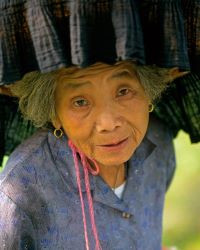Han Chinese, Hakka in Cambodia

Photo Source:
Copyrighted © 2026
Asia Harvest All rights reserved. Used with permission |
Send Joshua Project a map of this people group.
|
| People Name: | Han Chinese, Hakka |
| Country: | Cambodia |
| 10/40 Window: | Yes |
| Population: | 8,700 |
| World Population: | 43,923,800 |
| Primary Language: | Chinese, Hakka |
| Primary Religion: | Ethnic Religions |
| Christian Adherents: | 1.20 % |
| Evangelicals: | 0.55 % |
| Scripture: | Complete Bible |
| Ministry Resources: | Yes |
| Jesus Film: | Yes |
| Audio Recordings: | Yes |
| People Cluster: | Chinese |
| Affinity Bloc: | East Asian Peoples |
| Progress Level: |
|
Introduction / History
Although proud of their cultural distinctives, the Hakka have never claimed to be non-Chinese. Many famous Chinese have been Hakka, including Deng Xiaoping, Lee Kwan Yew, and Hong Xiuquan (the leader of the Taiping Rebellion).
There is much speculation concerning the historical roots of the Hakka. Some claim that they were the first Chinese people to arrive in China. Others claim that the Hakka are the descendants of the Xiongnu tribe. This much is agreed upon: At various stages between the fourth and thirteenth centuries AD, large numbers of people were forced to flee their homes in the war-torn Yellow River valley to seek refuge in southern China. These war refugees came to be known as Kejia - a Hakka word meaning "strangers" or "guests." When the savage Mongol hordes swept across China in the thirteenth century, many Hakka fled to the south to escape the carnage. Some of them migrated to Cambodia and other Southeast Asian countries.
What Are Their Lives Like?
Characteristically, the Hakkas in Cambodia have been folk dentists, shoemakers or Chinese medicine merchants. Today many Hakka families have started the popular noodle shops that line city streets in Cambodia. Hakka noodles, or Hakka Mee, are yellow noodles topped by minced chicken or pork and condiments. Hakka food is so delicious there are now Hakka Chinese restaurants dotting the West as well as East Asian countries.
What Are Their Beliefs?
The Hakka adhere to traditional Chinese religion. This can include aspects of Daoism, Buddhism and Confucianism. Commonly they worship the spirits of their ancestors, believing these spirits can affect their future and their fortune. Therefore, they make offerings and build shrines and altars in their honor. The Hakka depend on spirit healers for some of their needs. They have been less receptive to the gospel than most other Han Chinese peoples.
What Are Their Needs?
The Bible and the JESUS Film are available in the Hakka language; the people need someone to take the gospel to them.
Prayer Points
Pray for the Lord to enable and thrust out loving workers to the Hakka Chinese in Cambodia.
Pray for the Hakka to have receptive hearts to the things of Christ.
Ask God to raise up a church planting movement among the Hakka, drawing entire families to himself and leading those families to form and multiply house churches.